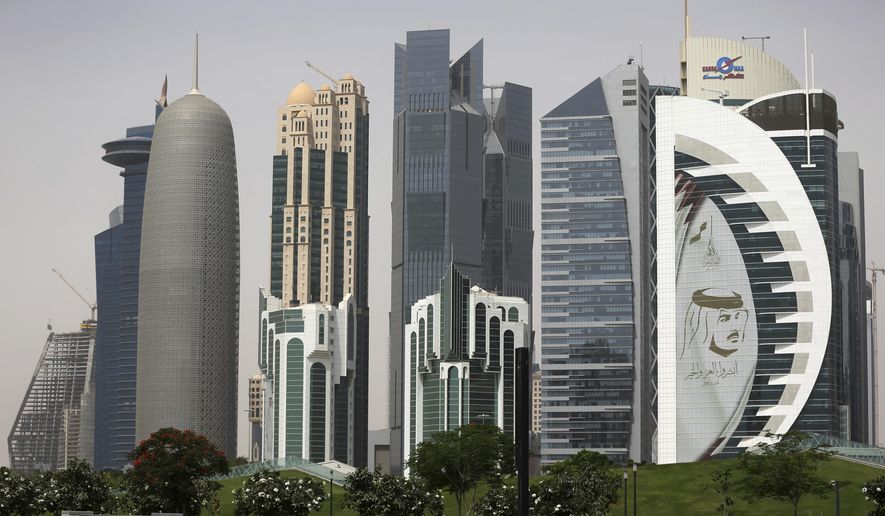Kuwait said Monday that Saudi Arabia had agreed to reopen its airspace and land and sea borders to Qatar in an apparent breakthrough toward resolving the diplomatic fight between wealthy Gulf Arab monarchies that has vastly complicated the Trump administration’s diplomacy.
Kuwait’s foreign ministry, which has played a key role in efforts to mediate a solution to the so-called Gulf Cooperation Council, or GCC, crisis, announced the rapprochement ahead of a GCC leaders’ meeting Tuesday in Saudi Arabia.
“An agreement has been reached to open airspace and land and sea borders between Saudi Arabia and Qatar as of this evening,” Kuwaiti Foreign Minister Ahmad Nasser al-Sabah said in a statement carried on television in Kuwait.
He added that Kuwait’s emir had spoken with Qatar’s emir and with Saudi Crown Prince Mohammed bin Salman and that “everyone was keen on reunification” with plans to sign a statement Tuesday promising to “usher in a bright page of brotherly relations.”
The Reuters news agency Monday quoted an unnamed senior U.S. administration official who confirmed the deal was in the works.
“It’s just a massive breakthrough,” the U.S. official told Reuters. “The blockade will be lifted. It will allow for travel amongst the countries as well as goods. It will lead to more stability in the region.”
Saudis officials had not explicitly confirmed the development as of Monday evening, although there were indications from Riyadh that the feud with Qatar may be easing. Tuesday’s GCC summit will be “inclusive,” leading the states toward “reunification and solidarity,” Salman told the Saudi state-run news agency.
The GCC has been mired in crisis since 2017 when Saudi Arabia, Bahrain and the United Arab Emirates — along with Egypt — banded together to impose a blockade against Qatar over what they claimed was Qatari support for jihadi groups and expanding economic relations with Iran.
Qatar rejected the charges, but the flap has for years presented a sticky challenge for Washington, which maintains America’s most strategic Mideast military outpost at the Al Udeid Air Base.
Monday’s announcement by the Kuwaitis raised questions about the extent to which a GCC thaw may be a result of the impending transition of power in the U.S.
The Trump administration spent years pushing for a thaw in tensions among the GCC nations, both publicly and behind the scenes. President Trump’s Middle East adviser and son-in-law, Jared Kushner, visited Saudi Arabia and Qatar in early December in a final attempt to secure a diplomatic breakthrough.
The move fits with a larger U.S. push to build a wall of solidarity between Israel and leading Arab states to contain Iran and its allies in the region.
The incoming Biden administration, meanwhile, is expected to pursue renewed diplomatic ties with Iran — the Mideast’s Shia Muslim powerhouse and the rival of predominantly Sunni Muslim Saudi Arabia. Ending the Qatar blockade could remove a stumbling block to better U.S. relations under Mr. Biden for the Saudis.
There was no immediate comment Monday by the UAE, Egypt or Bahrain, although recent days saw Emirati and Egyptian statements welcoming Saudi efforts to resolve the dispute. The senior U.S. official told Reuters it was Washington’s “expectation” other blockading nations would follow Saudi Arabia’s lead, while Qatar would suspend lawsuits it has filed against the embargo.
Qatari officials say for years they have to end their isolation, only to be spurned by the Saudis.
“We’ve been asking for [them to] come to the table of negotiations. Let’s put all of the cards on the table and discuss,” Lolwah Al-Khater, spokeswoman for the Qatari Ministry of Foreign Affairs, told The Washington Times in an exclusive interview last year.
She added, at the time, that the Saudis, as well as the Emiratis, had “shut down” all communication channels with Doha, “even the back channels.”
Qatar’s only land border is with Saudi Arabia, and the blockade choked off the natural entry point of dairy products, construction materials and other goods. It has been mostly closed since mid-2017, but opened briefly during the past three years to allow Qataris into Saudi Arabia to perform the hajj.
Qatari military forces participated in “joint” regional defense drills in Saudi Arabia in 2018. Many observers predicted a thaw could be in the works at the time.
• This article is based in part on wire service reports.
• Guy Taylor can be reached at gtaylor@washingtontimes.com.




Please read our comment policy before commenting.